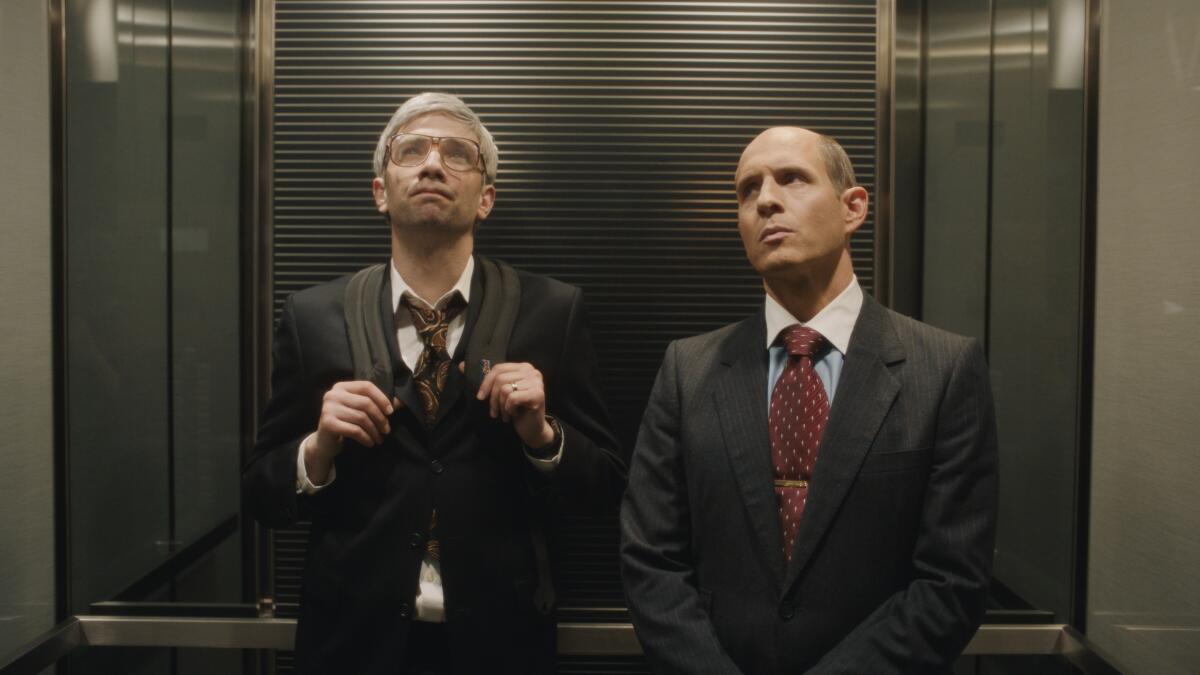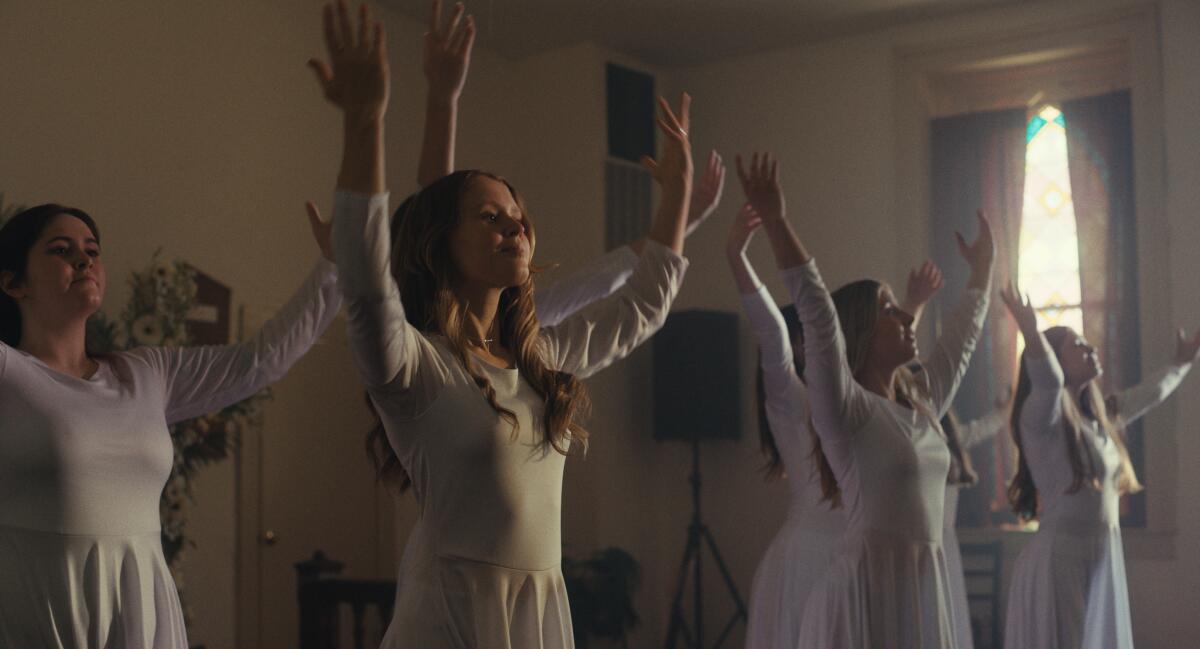Behind a tech company’s rise and fall in ‘Blackberry’

- Share via
Hello! I’m Mark Olsen. Welcome to another edition of your regular field guide to a world of Only Good Movies.
Summer Movie Preview. To kick off our coverage, Ashley Lee spoke to Halle Bailey about her role as Ariel in “The Little Mermaid.” As Bailey said, “This whole process was a lot on me, physically and mentally. I never thought I would ever be able to accomplish something like this, and coming out of it, I’m a very different person. I know now what I want for myself and my future.”
“Much like Ariel, honestly,” Bailey added. “Throughout this experience, I really feel like I learned a lot from her.”
Jen Yamato checked in with Louis Letterier, who stepped in at the last minute to direct “Fast X.”
“They’re the ne plus ultra of action filmmaking,” said Letterier. “The ‘Fast and Furious’ set pieces are always amazing because they have three acts within it — there’s a beginning, a middle and [an] end, and you never lose the characters within the action.”
And the entertainment team made a list of the movies we are looking forward to this summer, everything from “Past Lives” to “Oppenheimer,” “Barbie” to “You Hurt My Feelings” and “Haunted Mansion.” (I picked “Asteroid City” and “Bottoms.”)
Lourdes Portillo. The Mexican-born, Los Angeles-raised filmmaker has centered the lives of the Latinx community for decades and she is now receiving a tribute series from the Academy Museum of Motion Pictures. Running through May 21, the “Lourdes Portillo: Una vida de directora.” Portillo herself will be present for a number of the screenings, which include such works as “Vida,” “La Ofrenda: The Days of the Dead,” “The Devil Never Sleeps,” the Academy Award-nominated “Las Madres — the Mothers of the Plaza de Mayo” and “Corpus: A Home Movie For Selena” with “A Conversation With Academics About Selena.”
Dangerous Night Crews. The American Cinematheque is launching a new series with an eccentric energy that I kind of adore. “Dangerous Night Crews: Let’s Watch’m” is made up of films that don’t immediately all fit together, but then once you look over the program they make total sense. Movies about people prowling restlessly at night such as “Collateral,” “Nightcrawler,” “Zodiac,” “Judgment Night,” “The Warriors,” “After Hours” and “Escape From New York” should make for a great time in the theater.
Enjoying this newsletter? Consider subscribing to the Los Angeles Times
Your support helps us deliver the news that matters most. Become a subscriber.
‘BlackBerry’
Directed and co-written by Matt Johnson, “BlackBerry,” which premiered earlier this year at the Berlin Film Festival, tells the rise and fall of Research in Motion, the Canadian company behind the device that brought email to the mobile phone, with a mix of straightforward drama and sympathetic comedy. Jay Baruchel and Glenn Howerton give strong performances as Mike Lazaridis and Jim Balsillie, a techie and a businessman who achieve great heights before it all comes crashing down. The film is in theaters now.
For Tribune News Service, Katie Walsh wrote, “What emerges from the electronic noise and fussy aesthetic of ‘BlackBerry’ is a compelling portrait of a company that flew too close to the sun. Jim’s fast-and-loose tactics in running the business — poaching talent from Google, creating demand for the devices as status symbols, and selling them before the network capability was established — are matched by Mike’s innovative mind, but it could only last for so long, especially with Apple nipping at their heels. However, it’s the shortcuts and shady deals that do them in, not the shiny new iPhone. Perhaps Mike, a man driven by the sonic and tactile experience of electronics, was too attached to the satisfying clicking of the tiny keyboard. With 2000s nostalgia in the zeitgeist, maybe Icarus will rise again, though Johnson’s portrait indicates how unlikely that would be.”
I took a look at how “Blackberry,” along with other recent films such as “Air,” “Tetris” and the upcoming “Flamin’ Hot,” are all based around products, speaking to filmmakers from each. For his part, Johnson said there is a cynical reason behind the trend, that the products function as recognizable IP for audiences, while also adding, “But let me answer it not cynically, because we just happen to live in a world where all the modern successes are products. We do live in a world where the products that have been invented have changed the way that we live. You can be cynical about it and be like, ‘Oh, this is so stupid. Why are we celebrating this?’ But then look in the mirror. Are you using a smartphone? These things have shaped you whether you want them to or not. It’s the cultural backdrop that we live in. It’s the water we swim in.”
For the New York Times, Jeannette Catsoulis wrote, “Reveling in a vibe — hopeful, testy, undisciplined — that’s an ideal match for its subject, ‘BlackBerry’ finds much of its humor in Jim’s resolve to fashion productive employees from RIM’s ebulliently geeky staff, who look and act like middle schoolers and converse in a hybrid of tech-speak and movie quotes … More than anything, perhaps, ‘BlackBerry’ highlights the vulnerability and exploitability of creatives in a cutthroat marketplace. The push-pull between genius and business, and their mutual dependence (brilliantly articulated during Jim and Mike’s sales pitch to a wireless provider), is the movie’s real subject and the wellspring of its persistent yearning tone.”
For the Washington Post, Ann Hornaday said the film follows “a rags-to-riches-back-to-rags story arc serving as both an entertaining cautionary tale and a fond look back at the Before Times, when we weren’t hunched over our handheld dinguses, rabbit-holing through our personal silos. In a jagged, mock-documentary style reminiscent of Christopher Guest comedies and ‘The Office,’ director Matt Johnson — working from his and Matthew Miller’s adaptation of Jacquie McNish and Sean Silcoff’s book — infuses ‘BlackBerry’ with jolts of manic energy and pop nostalgia that are both alarming and soothing: Here’s what we were once, the film seems to say, before we let ourselves become the self-indentured serfs of our info-tech overlords.”
For Vulture, Bilge Ebiri wrote, “‘BlackBerry’ basically presents the story of RIM and the rise of the smartphone as a sitcom pitch: What happens when two affable, not-ready-for-prime-time dorks from Waterloo, Canada — brilliant engineer Mike Lazaridis (Jay Baruchel) and his can-do cheerleader pal Doug Fregin (Johnson) — are joined by a crisply suited, Harvard-educated, phone-smashing apex predator. Balsillie is not a tech guy, and it’s only by chance that he realizes the potential of Lazaridis and Fregin’s idea of a cell phone that can also send and receive emails. But he knows how to sell, and he knows how to go for the kill when he’s got something he knows people want. It’s a solid comic setup. One of the great pleasures of BlackBerry is watching Balsillie’s befuddled, running disgust at Lazaridis and Fregin’s hapless ways, at the chaotic ineptitude of their finances, their utter lack of business sense, their go-along-to-get-along management style. I would happily watch several seasons of these three going at it.”

‘Monica’
Directed and co-written by Andrea Pallaoro, “Monica” premiered at last year’s Venice Film Festival. The film tells the story of Monica (Trace Lysette), a trans woman who returns home to care for her ailing mother Eugenia (Patricia Clarkson) after years of estrangement. The movie is in theaters now, and Lysette, Pallaoro and co-star Emily Browning will be at Q&As at the Nuart on Friday and Saturday.
For the New York Times, Teo Bugbee wrote, “The director Andrea Pallaoro doesn’t burden this delicate tale of reconciliation with long monologues or extensive back stories, and the performances are compelling in their restraint. Both Lysette and Clarkson are naturally magnetic actors, and they don’t waste the attention they’re given on excess sentimentality. They bear their characters’ burdens with little more than a furrow of an eyebrow. Monica and Eugenia face each other’s scrutiny, and both performers respond to the challenge by protecting their characters’ mysteries.”
For IndieWire, Jude Dry wrote, “‘Monica’ is a meticulously crafted master class in restraint. … Of course, Lysette is the canvas, brush, and paint that makes ‘Monica’ shine. Stunning to watch and radiating great depth, she carries the film with a graceful dignity. Her comedic timing made her a standout in ‘Transparent’ and ‘Hustlers,’ and it’s refreshing and inspiring to see her take on a dramatic role with such confidence and ease. What’s more, ‘Monica’ achieves a delicate balance that’s wholly unlike other trans films, delivering a universal human story that neither ignores nor obsesses over the character’s trans-ness. ‘Monica’ raises the bar for trans stories onscreen, and Lysette takes her rightful place as its muse.”

‘The Starling Girl’
The feature debut for writer-director Laurel Parmet, “The Starling Girl” premiered earlier this year at the Sundance Film Festival. Seventeen-year-old Jem Starling (Eliza Scanlen) has been raised in a strict fundamentalist Christian community in Kentucky. Only her love of dance provides an outlet for her growing desire for something more, as Owen, a youth pastor (Lewis Pullman) takes a special interest in her. The film is in theaters now.
For The Times, Robert Abele wrote, “Because we’re seeing everything through Jem’s eyes — cinematographer Brian Lannin creating an almost vérité-documentary rigor on that front — patriarchy’s sinister hold feels ever-present, and Scanlen is excellent at the minute-to-minute thrill and agony of a situation that’s educating her fast in human frailty. But Owen is no less fascinating, Pullman’s sharp turn pinned to where dissatisfaction leads the weak-willed. … ‘The Starling Girl’ doesn’t always hold our attention, mainly due to an occasionally shaggy pace that forgets we’re often ahead of the plot. … And yet there’s a generous reading of [the film’s the ending]: a female filmmaker no longer running alongside her anguished creation yearning to escape, but finally giving her something of her own, a chance to reconcile all she’s ever known, who she knows she is, and what might lie ahead.”
For the Hollywood Reporter, Jourdain Searles wrote, “With ‘The Starling Girl,’ 2018’s ‘Sharp Objects’ and 2019’s ‘Babyteeth,’ Scanlen has proven herself deft at portraying strange and fascinating young women. There’s quiet power in Jem’s eyes — on some level she knows her potential, even as adults try to shame her into thinking otherwise. One of the smartest things about Parmet’s film is the way it portrays internalized misogyny in her female characters. ‘The Starling Girl’ is a complex, often disturbing portrait of the way women have been pressured to shrink themselves and pass on that shame to their daughters. Somewhere inside them they know it breeds unhappiness, but for them it’s a small price to pay for admittance into the kingdom of Heaven. While the world around them is changing, these women are convinced the old ways are best. But as Jem’s journey shows us, repression and shame always lead to rebellion.”
For IndieWire, David Ehrlich wrote, “Parmet’s decision to firmly anchor this story from Jem’s POV allows ‘The Starling Girl’ to pulse with its young heroine’s ecstasy and confusion, even if the broad predictability of how things play out gives undue weight to the less familiar specifics of Jem’s religious subculture (i.e. a plotline about courting). It helps that Scanlen’s performance refuses to let this movie feel trite. The Australian actress, whose work in ‘Babyteeth’ and ‘Little Women’ have already established her as a genius of desperate self-becoming, plays Jem as a young woman who feels everything in her life with evangelical intensity. That includes her love for God, which is ultimately too pure for her to understand what part of herself she’s meant to be ashamed of. Owen tells Jem that enjoying God’s creation is a way of honoring Him, and by the end of this gripping and well-realized drama — which only grows more effective during a confident final act that threatens to strip Jem of her personhood — that teaching becomes the only path by which she might be able to restore some faith in herself.”

Only good movies
Get the Indie Focus newsletter, Mark Olsen's weekly guide to the world of cinema.
You may occasionally receive promotional content from the Los Angeles Times.




